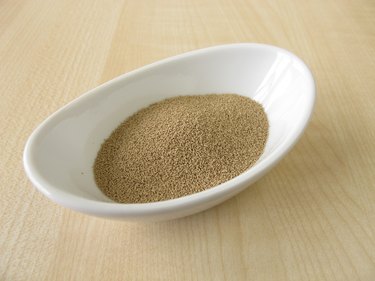
Yeast extract is the general name for various yeast products made by removing cell walls of the yeast culture and using the cell contents as food additives, flavorings and nutritional supplements or to make beer. Brewer's yeast and nutritional yeast are commonly grown specifically to make yeast extract supplements and should be distinguished from baker's yeast, which is a different product made for a different purpose. Supplemental yeast extract can be consumed in liquid form, within food spreads or as powdered capsules. The health benefits of yeast extract are directly related to its high nutrient content, although consulting with your doctor before embarking on supplementation is always recommended.
Manufacturing Yeast Extract
Video of the Day
A common method for making yeast extract for supplements or food products, such as Vegemite and Marmite, is to add salt to a suspension of yeast. The yeast cells shrivel up and start to break down, especially once heat is added. The thick cell walls of the yeast are then removed, which leaves the nutrient-rich contents of the cells. The processed extract is a very good source of protein, vitamins and minerals.
Video of the Day
Protein
Nutritional yeast is the deactivated form of the species S. cerevisiae. It is sometimes referred to as the "vegetarian's protein" because it is a rich source of complete protein, containing 18 amino acids, according to "Contemporary Nutrition." Up to 55 percent of nutritional yeast extract is composed of protein or amino acids, which are needed by your body to build muscle, connective tissue and enzymes. Protein can also be metabolized within cells for energy. If you are a vegetarian or on a low-cholesterol diet, yeast extract is a good substitute for meat, dairy products or nuts, which are also protein-rich but high in fats.
Vitamins
Brewer's and nutritional yeast extracts are also a rich source of B vitamins, particularly B-1, B-2, B-3, B-6, B-12 and folic acid, as cited in "Biochemistry of Human Nutrition." B vitamins are all involved in the metabolism of carbohydrates, fats and proteins into usable energy, but some are also important for digestion, immunity and red blood cell production within bone marrow. Some B vitamins are also needed to maintain the health of your skin, nails and hair, and B-12 and folic acid are required for healthy brain chemistry and higher brain functions, such as cognition and short-term memory. Some yeast extracts have additional vitamin B-12 added, which is deficient in many vegetarian foods.
Minerals
Yeast extracts contain at least trace amounts of most essential minerals, but they are an especially good source of chromium. Chromium has many health benefits such as providing your body with an added ability to help lower insulin levels and combat diabetes. A study published in a 2002 edition of the "Journal of Nutrition" found that yeast extract stimulates glucose metabolism and inhibits lipolysis in the fat cells of rats, which was thought to be partially related to its chromium and B complex content. Yeast extracts are also decent sources of zinc, selenium, phosphorus, magnesium, manganese, copper, vanadium, molybdenum and lithium.
Clearing Up Confusion
Brewer's and nutritional yeast extracts are made from deactivated yeast species that cannot be used for leavening or fermenting. Some people mistake yeast extract as being the substance that causes Candida yeast infections, but that is not the case. Yeast extracts are usually grown on mixtures of molasses and cane sugar, deactivated and then pasteurized in the final stages. Yeast extracts do not contain Candida species nor are they able to reproduce and cause infections. Yeast extracts are also gluten-free products, but they shouldn't be taken with MAO inhibitors because the combination may raise your blood pressure, according to "Medical Nutrition and Disease." If you have allergies, you may be sensitive to yeast extracts and should be cautious.